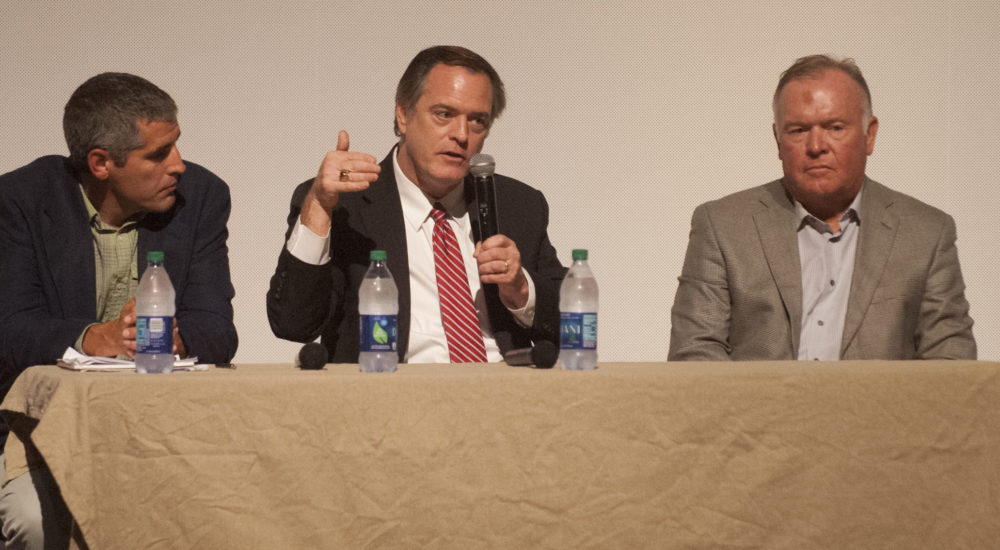We hosted a film screening of The Devil We Know in Wilmington, September 6. Nearly 425 citizens showed up for the film and the discussion afterward with Cape Fear Riverkeeper Kemp Burdette, Southern Environmental Law Center’s NC Director Derb Carter, and nationally-recognized lawyer Rob Bilott – who the New York Times Magazine called ‘DuPont’s Worst Nightmare‘.

We heard from many who attended that:
- You are upset the film is not yet available to the general public, and
- The film made you feel angry and hopeless.
We are here to assuage both of these concerns.
First, we’d like to let you know that as soon as the film made its debut earlier this year at Sundance, Cape Fear River Watch’s Clean Water Matters team began contacting the producers, sharing our story, and pleading for the opportunity to show this film as soon as it was made available to a distributor. We are proud to share that we were among the first cities anywhere in the US and Canada (outside of film fests) to show this film publicly.
It’s clear from the response that we were right about its impact. We are immensely grateful that so many of you came out to appreciate this important work. And, we are proud of our media and our citizens, because it was evident from the intelligent questions and comments shared during the discussion that our community is paying attention.
While the film is not publicly available yet, we are happy to share that local nonprofit, Working Films, in partnership with Cape Fear River Watch and North Carolina Conservation Network, has begun a statewide tour of the film – beginning with a screening in Raleigh, September 19. We will post the link to the full tour schedule as soon as it is available. Additionally, you can pre-order the film (with expected release October 16) on iTunes by visiting the film’s website.
Now, on to the feeling of hopelessness that some of you have shared since viewing this film. We understand this film hits home – and hits hard. It’s easy to feel like there’s nothing you can do. But, simply put, if you feel that way, you are wrong. Throughout history, the only changes in environmental policy were brought about by citizens taking action – this is a fact. We hope you turn your feeling of hopelessness into action. Here are a six simple things you can do – that WILL make a difference.
-
- Vote & Encourage Others to Vote: Do your research and seek out the candidates put public and environmental health ahead of corporate profit; provide volunteer help with voter registration or voter turnout campaigns.
- Stay Educated & Educate Your Friends and Family: the first step toward change in environmental policy is education. Join Cape Fear River Watch and stay involved.
- Submit Your Comments on Managing PFAS (Per- and Polyfluoroalkyl Substances) to EPA Before the September 28 Deadline: Visit the Clean Water Matters Take Action page to get started.
- Contact your NC elected officials and Tell Them to Fund the Department of Environmental Quality (DEQ); for information about the last nine years of gutting of the only agency with the power to regulate corporate polluters – click here.
- Call DEQ: Tell them to shut down the fluoroproducts manufacturing processes at Chemours until they have installed technology to ensure there are no further toxic emissions into our environment.
- Be a Smart Consumer: Corporations make things because we purchase them. Avoiding brands (or food) that use or are treated with toxic chemicals creates demand for cleaner products:
- Nobody needs to cook with Teflon. There are way too many alternatives. Purchase them! (Did you know that Chemours warns consumers not to cook on their Teflon pans around pet birds?!!) P.S.: LOVE these cast iron pans – use them for EVERYTHING! Share your image with hashtag: #tosstheteflon!

- Many manufacturers of stain- and water-resistant products have phased out PFOA (8 carbon chain) and replaced it with C6 (a 6-carbon chain like GenX), or in the case of Scotchgard, a C4 called PFBS. Scientists are concerned that the health effects of these shorter-chain compounds may not be much different than the long-chain versions, AND because the shorter-chain chemicals tend to be less effective, more is used to get the same results. Opt-out of stain-resistant coatings for carpeting, furniture and clothing, and rather than buying ‘water-proof’ products, choose ‘water-resistant’ which are less likely to contain PFAS chemicals — or just get a good, naturally-made umbrella.
- Don’t buy personal care products with “PTFE” or “fluoro” ingredients.
- Ask manufacturers whether their products contain PFASs, since they likely won’t be listed on labels.
- Avoid processed food and take-out that uses grease-resistant packaging.
- Make popcorn on the stovetop instead of in PFAS-treated microwave bags.
- Nobody needs to cook with Teflon. There are way too many alternatives. Purchase them! (Did you know that Chemours warns consumers not to cook on their Teflon pans around pet birds?!!) P.S.: LOVE these cast iron pans – use them for EVERYTHING! Share your image with hashtag: #tosstheteflon!
“We have lived our lives by the assumption that what was good for us would be good for the world. We have been wrong. We must change our lives so that it will be possible to live by the contrary assumption, that what is good for the world will be good for us. And that requires that we make the effort to know the world and learn what is good for it.” ―
To view photos of the film screening event, taken by photographer and Cape Fear River Watch Board member Alan Cradick, visit the album on his website.

